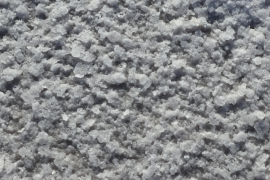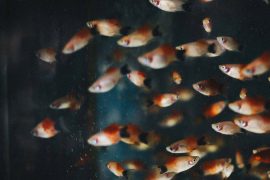I got pregnant in October two months after a miscarriage. I didn’t feel happy at first. Gun shy, my father would have said, but he died, of lymphoma, just before Christmas.
We hadn’t told him about the baby. We thought it would make him sadder, hearing what he’d miss. He’d been so excited when my son Tad was born.
He included me in his enthusiasm. Isn’t she good with the baby, he’d say to my mother, see how he looks at her. He loved me then, I was sure.
Tad was almost three when my father died.
He liked to make a tent with blankets in the living room, have me in there with him, reading him book after book. Our special place, he called it. It was stuffy, nothing on which to rest my back.
Jon, my husband, went with me to doctor’s appointments, take me out for ice cream afterwards.
“I’m gaining too much weight.”
The doctor, he said, had talked to him while I was making my next appointment. “He said you have maternal failure to thrive caused by critical deficiencies of sugar, cream, and chocolate.’”
After my father died my mother announced nobody needed to worry about her, said she’d done all her grieving while he was dying.
When she visited Jon needed to take two trips to her car to bring in all the presents she’d brought.
“I hope I’m not coming too much,” she’d say, “I don’t want to wear my welcome out.”
“No. Oh, no.”
She’d play and play with Tad, wouldn’t put him down for his nap. “I just like being with him.”
Once, before she left, she gave me a check for a thousand dollars. “In case there’s something you need I didn’t think of.”
A month before my due date Jon had a training session out of town, wanted me to go with him. While he was in class, he said, I could do things with Tad, a little vacation before the baby.
The way he’d told me he’d really like it if I could come reminded me of when we first met. He was too shy to ask me in person, wrote me a letter instead, inviting me to dinner, enclosing a stamped envelope.
On the first day of our trip Tad and I went to a children’s museum. The big water table was his favorite. “Watch me operate the sluice gate, Mommy.”
They had vinyl aprons for the children to wear and I put one on Tad, but he still got sopping, was amused by the squeaking sound his shoes made when we walked to a waterfront restaurant for lunch. “They’ll think I’m a fisherman.”
We sat at the long wooden counter in the restaurant because Tad liked the high stools, admired the mirror and bottles behind the counter. “A saloon!”
“Get you a drink, partner? Wet down the dust from the trail?” The waiter made him an Italian soda, pouring in a bit of this, squirting something of that.
“Splendid,” Tad told him, “just splendid.”
We shared a big, hot, messy crab sandwich, followed by strawberry shortcake.
When the waiter was telling me what blue eyes I had, I wondered if he was flirting with me, though I was big as a house and my face was puffy and my ankles were puffy and I hadn’t been able to get my ring off my puffy left hand for a month.
“Your son’s eyes are the same,” he said.
Back at the hotel Tad and I napped together. I woke up before he did, lay in bed beside him, remembering without pleasure a dance in eighth grade. Intrusive thoughts, I’ve heard them called.
I tried pushing them aside by imagining the baby. A boy, I was sure. I wanted to name him Gus, after my mother’s father. When she was pregnant with me my mother had proposed it as a name, “if it’s a boy,” but my father hadn’t liked it.
Could we have dinner early, I’d asked my mother the afternoon of the dance, because I wanted to shower and do my hair just before the dance, be absolutely fresh. I had a scarf I liked to wear with my turquoise dress but, if I did, would that make it too casual? I didn’t want to look as if it was just another school day. The red dress was so pretty, but I’d worn it for the music program last week.
It was my first dance and, at school, it was all we talked about, the girls at least. It’s for everyone, the teachers said. Come and have a good time. No couples, no dates.
I wouldn’t have been asked for a date, anyway, but I imagined various scenarios at the actual dance with boys I liked and, I hoped, like me.
Maybe my father was already mad about something, I don’t remember. My concerns were addressed to my mother but he was the one who lost patience with me. Who did I think I was, turning the whole family inside out for an eighth grade dance, ruining everyone’s day?
“Not the whole family,” I said. Sometimes he’d stop if I was bold, “Suzie isn’t home.”
Because Suzie has friends, he said. I might have a few of those too if I wasn’t a little liar.
And If I’d put all this energy into getting good grades, if my priorities weren’t based on completely false values, well, he’d be a whole lot happier, wouldn’t he? I’d be a girl he and my mother could be proud of.
If I was going to carry on like this, he said, I could just stay home.
“Francis,” my mother said, “please.”
I went to my room and locked the door.
He stood at the door, screaming. What was wrong with me, what? They’d given me oxygen when I was born and they must have given me too much, that’s all he could figure out.
I could hear my mother then. No, no, no. Two puffs that was all. Please. Please. Please.
He yelled at her too, said I needed to hear it.
Oh, and I should know his parents thought I talked back too much, had a bad attitude, wasn’t a nice girl. Of course they wouldn’t say anything but I was a big disappointment to them. Huge.
“To me as well,” he said before going away.
I couldn’t stop crying.
My mother knocked, said I could still go to the dance.
I didn’t answer.
After a while I had to use the bathroom. When I went back my father was waiting in my room, sitting on the chair across from my bed.
“I may have said some things I didn’t mean.”
Which ones, I wanted to ask. Which ones didn’t you mean?
He’d gone smiley, like St. Nick in the Clement Moore poem. A wink of his eye and a twist of his head, soon gave me to know I had nothing to dread.
Never, I told myself. I’ll never trust you.
“If you want to go to the dance, have a good time with your friends, don’t let me stop you. Don’t give me that power. Don’t give anyone that power.”
“No.”
But I did go. My face wasn’t red as I’d expected; I’d cried so much it was white. My mother rubbed in a little foundation, just a smidge because it was hers, and too dark for me, to make me less ghostly looking. She flicked her mascara wand over my upper eye lashes too. “Daddy won’t notice.”
“Miss America,” my father asked, when he saw me in my dress, the turquoise one because the red made me look even paler, “what have you done to my daughter?”
Such lengths he went to. How bad I must have looked.
In the car, he told me he was proud of me for pulling myself together. “You’re going to have such a good time,” he said, when he came around to open the door for me.
The door opening was not usual with him but my due from boys, he said, now I was becoming a young lady. Girls have to demand respect or boys will take advantage of her.
On the way in I saw a boy I liked, Vance, with some other boys. He sat next to me in Social Studies, talked to me, used to imitate the little boy in the Bayer’s Children Aspirin ad: Mothers are like that, yes, they are, making me laugh.
He saw me, said my dress was pretty.
I thanked him enthusiastically, thinking I was off to a good start.
They were playing records over the PA system, Another Drag, by the Buckinghams. “Good song,” I said, hoping he’d ask me to dance, or at least keep talking to me.
He was studying my dress. “You know who likes that color? Carter.”
Carter, a tall boy with dark hair and gold-rimmed glasses like John Lennon’s, was out of my league, but I fantasized about him. How could Vance have known?
“He’s here tonight. He said he was going to ask you to dance. I think he went into the cafeteria. Why don’t you go there, show him your dress?”
The boys he was with laughed. I headed in the opposite direction of the cafeteria, to the girls’ locker room where I spent the next two hours.
Some of the girls who took refuge there cried but I was done with that. The month before, in Social Studies, when I was about to sit, Vance yanked the chair out under me and I’d fallen, coming down hard on my tailbone. “Coccyx,” someone said and everybody laughed.
The teacher got mad at me, as if I’d done it on purpose. I’d sucked it up, because I thought Vance liked me.
I was stupid, I told myself. Was anyone ever so stupid?
When I got home Suzie was in bed. My father pulled out a chair for me at the kitchen table. He and my mother sat with me and we ate cherry pie left from dinner. How was the dance, tell us all about it.
It was wonderful, I said. I had the best time.
Her eyes are shining, I heard my father tell my mother when I went to bed.
He wouldn’t want me remembering him at his worst. I was ashamed, told myself he’d done more good than bad. I summoned up nice things he’d done, dismissed them. He’d done it to make something up to me, or because my mother told him to. He only took us to the movies he wanted to see.
I was glad when Tad woke and we could go to the indoor pool.
The water was too deep for him to stand so he practiced swimming towards me but mostly I carried him, swooping him in and out of the water, holding him in my arms while he showed off his water wrinkled hands: “Look, Mommy, I have brains in my fingers.”
What a day, Jon told us, when he came, standing at the edge of the concrete in his good clothes. “You never saw people so full of themselves: ‘In my practice I’ve found this technique to be highly effective, blah, blah, blah…’”
He was too tired to swim. He didn’t want to go out to eat. We could order Chinese.
I was reading to Tad when Jon saw the receipt from the restaurant on the dresser.
“Twenty-nine dollars seems like a lot to pay for lunch, especially if you didn’t get anything extra for Tad.”
Tad looked up, because of Jon’s tone or because he heard his name. I continued to read.
“Did you know you left a thirty percent tip?”
He knew I didn’t like it when he interrupted reading time.
Tad fell asleep immediately, worn out from the pool.
I’d already rehearsed what I wanted to say. Why do you want to make me feel bad?
Jon would dig himself in deeper. That isn’t what I meant. I just thought it was a lot to pay.
Tad had a dump truck then. When you pressed the button to activate the dumping mechanism, you’d hear a deep male voice. Drop it. Let it go.
I went to our bed where Jon sat, put my arm around him. He said he was sorry.
“Don’t worry about it,” I laid my free hand on his groin.
He looked down in delight. “But I thought…”
“It won’t hurt the baby and we won’t have many more chances for a while.” After the baby comes you’re supposed to abstain for six weeks. I would have been too self-conscious anyway, the way you leak milk and blood after the baby is born. “Besides, we’re in a hotel room.”
Before Tad we told each other there was a law requiring married couples to have sex in every hotel room they visited.
“I guess we could go into the bathroom.”
“Or the balcony.” I said, and pushed him down onto the bed. “That’s one fine soldier.”
John liked the tighter fit. “Oh, Goldilocks, this is just right.”
It didn’t hurt as I’d feared. What I felt was everything rising. Up, up.
I bleat like a sheep at climax. Jon calls it lovely.
Tad stirred and Jon laughed because I scrambled into my nightgown.
He woke slowly, crawled in between us. I hoped he didn’t notice the bleachy semen smell.
He observed our Diet Cokes. “I’m very thirsty.”
You can have a couple of swallows of mine, I told him, if you’ll go right back to sleep.
“In your own bed,” Jon said.
But after the Coke he shut his eyes as if he couldn’t stay awake another minute, flopped back onto the bed. He stayed, nestled in the crook of my arm.
Jon reached over to take hold of my hand. I fell asleep as he was telling me I was beautiful. “You don’t know. You just don’t know.”
JANE SNYDER’S stories have appeared in Broadkill Review, Frigg, and Maudlin House. She lives in Spokane.
Like what you’re reading?Get new stories, sports musings, or book reviews sent to your inbox. Drop your email below to start >>>
NEW book release AWRY by duncan b. barlow. Order the book of stories of which Brian Evenson calls “meticulous and precise, painful and surprising.”
GET THE BOOK



